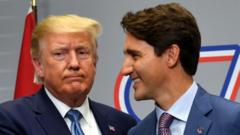Trudeau stresses the importance of protecting jobs and trade ties while addressing the implications of a potential trade war with the United States.
**Trudeau Critiques Trump’s Tariff Strategy: “An Attack on Canada’s Economy”**

**Trudeau Critiques Trump’s Tariff Strategy: “An Attack on Canada’s Economy”**
In a forceful response, Prime Minister Trudeau pledges to fight back against US tariffs that threaten Canada's economy.
In a recent press conference, Canadian Prime Minister Justin Trudeau condemned U.S. President Donald Trump's expansive tariffs on Canadian goods, referring to the actions as “a very dumb thing to do.” Trudeau asserted that these measures could lead to what he termed “a total collapse of the Canadian economy” and insisted that Canada will never become the “51st state” of the U.S.
Trump's administration imposed a 25% tariff on various products entering the U.S. from Canada and Mexico, contributing to heightened tensions. The U.S. president also announced increased levies on goods imported from China. In response, Trudeau unveiled retaliatory tariffs targeting $155 billion of American exports, warning of severe ramifications for both nations if the trade conflict escalates.
"This is a time to hit back hard and to demonstrate that a fight with Canada will have no winners," Trudeau commented, emphasizing the need for the swift removal of these tariffs to protect the Canadian economy.
Trump maintains that his tariffs aim to protect American jobs, manufacturing, and address issues such as immigration and drug trafficking. He attributed the rising fentanyl crisis to imports from Canada, a claim countered by Trudeau, who highlighted that only a minimal percentage of fentanyl intercepted at U.S. borders originates from Canada.
Following Trudeau's statements, Trump issued a warning via social media, asserting that any retaliatory tariffs imposed by Canada would be met with equivalent measures from the U.S.
In parallel, Mexican President Claudia Sheinbaum echoed Trudeau's concerns, declaring that there was “no justification” for Trump's tariffs and suggesting retaliatory actions to follow.
According to economic experts, the tariffs threaten to increase consumer prices across North America, raising fears of a wider trade war. Tariffs are essentially taxes aimed at protecting domestic industries from international competition while boosting local employment.
Canada's retaliatory measures include an initial $30 billion tariff on U.S. goods, with an additional $125 billion tariff to follow in three weeks. The Canadian government acknowledges that the tariffs threaten up to a million jobs, raising anxieties among workers in industries like automotive manufacturing. One worker, Joel Soleski, expressed his fears of job loss as he recently purchased a home.
Ontario Premier Doug Ford indicated that the tariffs could lead to factory closures on both sides of the border and labeled the tariffs as “reckless.” He warned of potential economic repercussions including recession and rising unemployment in both countries.
Canadian responses have also involved utilizing leverage over electricity exports and cancelling contracts with American firms, impacting key industries. Ontario, for example, is considering a significant levy on electricity sales to the U.S., while other provinces are removing U.S.-made products from local shelves.
On the global front, tensions extend to China as the country faces its own tariffs and vows to contest any trade war vigorously with countermeasures, particularly against U.S. agricultural products.





















